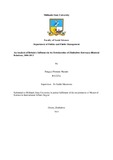Please use this identifier to cite or link to this item:
https://cris.library.msu.ac.zw//handle/11408/3124Full metadata record
| DC Field | Value | Language |
|---|---|---|
| dc.contributor.author | Maraire, Fungayi Promote | - |
| dc.date.accessioned | 2018-09-03T13:50:35Z | - |
| dc.date.available | 2018-09-03T13:50:35Z | - |
| dc.date.issued | 2015 | - |
| dc.identifier.uri | http://hdl.handle.net/11408/3124 | - |
| dc.description.abstract | The study analyses the deteriorating bilateral relations between the two Southern African Development Cooperation (SADC) member states of Zimbabwe and Botswana as from the year 2000 to 2013. The research aims to establish the extent of Britain‘s liability in the deterioration of Zimbabwe-Botswana bilateral ties. Therefore, the major objectives of the study are to analyse Britain‘s influence in the deterioration of Zimbabwe-Botswana bilateral relations as from 2000 to 2013 as well as evaluate the political, economic, military/security and social dynamics surrounding Britain‘s influence in the deterioration of these relations in the deterioration of Zimbabwe-Botswana bilateral relations during the period under study. In addition, the research seeks to proffer scholarly and policy recommendations on the normalisation of Zimbabwe-Botswana bilateral relations. The research study adopts a qualitative methodology in both data collection and analysis. Primary data derived mainly from interviews and questionnaires is utilised extensively throughout the study and this is used in collaboration with data derived from secondary sources such as published books and journal articles. Data collected is analysed using content analysis and discourse analysis as the main analytical tools. The theoretical framework of the study is based upon theconstructivist approach to international relations as propounded by Alexander Wendt. Theresearch study establishes that, indeed bilateral relations between the two SADC states were frosty during the period under study with land policies, governance and sovereignty being some of the contested issues. Furthermore, the study notes that, while Britain could be held as partially liable for the state of bilateral relations between Zimbabwe and Botswana post year 2000, the two African states were ultimately responsible for their unsound bilateral relations. The study recommends the initiation of dialogue and the strengthening of African institutions as a means of normalising and maintaining cordial bilateral ties between the two African states. Furthermore, the study notes that the resuscitation of the Zimbabwean vi economy would go a long way in thawing the frosty bilateral ties between the two states. This is due to the fact that some of the contested issues such as the influx of Zimbabwean economic refugees into Botswana have their roots in the declining Zimbabwean economy. | en_US |
| dc.language.iso | en | en_US |
| dc.publisher | Midlands State University | en_US |
| dc.subject | Bilateral relations | en_US |
| dc.subject | SADC | en_US |
| dc.title | An analysis of Britain’s influence in the deterioration of Zimbabwe-Botswana bilateral relations, 2000-2013 | en_US |
| item.languageiso639-1 | en | - |
| item.grantfulltext | open | - |
| item.fulltext | With Fulltext | - |
| Appears in Collections: | Master of Science in International Affairs Degree | |
Files in This Item:
| File | Description | Size | Format | |
|---|---|---|---|---|
| maraire masters thesis final WM edits.pdf | Full Text | 842.05 kB | Adobe PDF |  View/Open |
Page view(s)
212
checked on Feb 14, 2026
Download(s)
112
checked on Feb 14, 2026
Google ScholarTM
Check
Items in MSUIR are protected by copyright, with all rights reserved, unless otherwise indicated.



